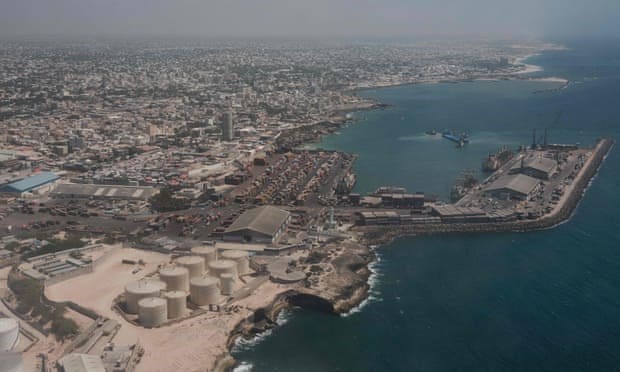
Wednesday March 15, 2023
By Nimo Omer
A report published by the Observer tells the story of young people of Somali descent being held against their will to be ‘de-westernised’
A view of Baidoa, Somalia. Photograph: Scott Peterson/Getty Images
Good morning. On Sunday, the Observer
published a report I had been working on for the past eight months about “cultural rehabilitation centres” in Somalia and Kenya, where British citizens of Somali heritage are being held against their will. It’s a complicated story of cultural identity, assimilation, and unlawful detention, but at the heart of it are the voices of those people who are left in dire situations abroad, with little to no help from the UK government.
Fadumo, Bilan and Hodan (all names have been changed) trusted me with their stories – all of them begin in England and all end up in a cultural rehabilitation centre in Mogadishu, Somalia. Fadumo was just 16 when she was sent to one such centre, after being told that she was going on holiday to Dubai.
Today’s newsletter explains how young British-Somalis are ending up in these harrowing situations, and the blindspots in British society that mean citizens can disappear for months or years at a time. That’s right after the headlines.
‘There wasn’t much you could do – you would even get into trouble for sleeping’
Families send wayward teenagers and young adults to “cultural rehabilitation centres” in the hope that they will straighten them out and “de-westernise” them. The truth is that the centres often operate illicitly and, as a result, the people in them are left to endure abuse, including physical beatings, shackling and solitary confinement. A lack of regulation and oversight and a preoccupation with profit has meant that the number of these centres have grown over the past decade, though there are no concrete figures to show how widespread they really are.
Muslim women on Seven Sisters Road, in north London. Photograph: Dinendra Haria/Alamy
What are cultural rehabilitation centres?
Simply put, cultural rehabilitation centres are facilities primarily for Somalis who were born and/or raised in western countries, which claim to provide them with a strict education on their heritage and their faith. Young people are sent there by family, often parents, who feel that their child is in better hands abroad than they are in the UK.
These centres have not appeared out of nowhere. The practice of dhaqan celis (which loosely translates to “return to culture”) is a well-known phenomenon within the Somali community, and used to generally refer to families who sent a child to stay with relatives in Somalia over the summer, or for a more extended visit. But in recent years it has increasingly meant that a person has been sent to a centre that offers a boarding school or boot camp type experience. One lawyer I spoke to described them as “detention centres”. Some who end up there stay for as long as a year.
Parents pay hundreds of US dollars for their child to purportedly learn about their roots, their faith and the virtues of discipline. The young people I spoke to, however, said that they did not learn much, if anything at all. They spent most of their mornings reading the Qur’an, with a short break in the afternoon, and then continued reading until the evening. “You had to find ways to occupy your time, there wasn’t much you could do – you would even get into trouble for sleeping,” Fadumo told me.
Anything could be viewed as an infraction: incorrectly reciting the Qur’an, sleeping in, talking in a certain tone. The punishment could be anything from a brutal beating, to being held in a dark room for days on end, to chaining a person to a wall so that they could not sleep. Residents are not allowed to leave the facilities, nor are they allowed to tell their parents what is really going on.
Why do parents send their children away?
 An aerial view of Mogadishu, Somalia. Photograph: Yasuyoshi Chiba/AFP/Getty Images
An aerial view of Mogadishu, Somalia. Photograph: Yasuyoshi Chiba/AFP/Getty ImagesThere is no universal answer for why families feel the need to do this. Parents have been known to send their children away if they believe that they are getting involved with gangs or crime, or because they have complex mental health problems, or simply because of a more abstract fear of cultural “corruption”. Many Somalis who are living in the UK or Europe today are there because of the 1991 civil war which forced nearly 2 million people out of their country. When combined with social alienation in their new homes, the results can be troubling.
What are the laws around this?
After months of contacting embassies, government departments and legal experts, it has become clear that there is no adequate legal framework around this issue. While young people are almost always tricked into going to these centres, the cases I presented do not technically meet the legal threshold for trafficking. Kenyan and Somali authorities have raided a number of centres, but as they operate outside the purview of the law they seem to reappear frequently.
So far, it seems that western governments are saying that their hands are tied: Somalia is too volatile a country, and one in which they have little presence. But questions around prevention still remain. One of the young people I spoke to was known to British social services and was enrolled in a school – how did she disappear without anyone flagging it to the relevant authorities?
Given the profit incentive, there is little chance that these centres will disappear on their own. And the underlying cultural fears will take a long time to address. However, the government has a responsibility to protect its citizens – regardless of their heritage. Until adequate provisions are put in place, young people like Fadumo and the others I spoke to will continue to fall through the cracks.